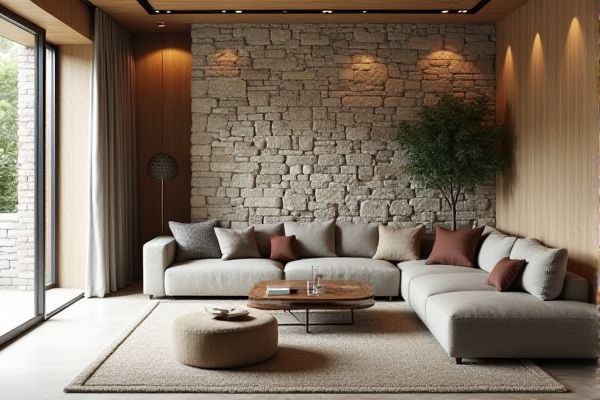
Gabion walls offer superior drainage and flexibility compared to traditional stone walls, making them ideal for erosion control and uneven terrain. Explore the rest of the article to determine which wall type best suits your project's needs.
Table of Comparison
| Feature | Gabion Wall | Stone Wall |
|---|---|---|
| Material | Wire mesh cages filled with rocks or stones | Natural or cut stones stacked or mortared |
| Construction Time | Faster installation, typically days | Slower, can take weeks depending on size |
| Durability | Highly durable, resistant to erosion and weather | Long-lasting, may require maintenance over time |
| Cost | Generally more cost-effective due to materials and labor | Higher costs due to labor and stone quality |
| Flexibility | Flexible structure adapts to ground movement | Rigid and less adaptable to shifting soils |
| Environmental Impact | Eco-friendly; promotes vegetation growth and drainage | Less permeable; may affect drainage negatively |
| Maintenance | Low maintenance; minimal repairs needed | Requires periodic inspection and repairs |
| Appearance | Industrial or natural, depends on stone fill | Classic aesthetic, customizable with different stone types |
Introduction to Gabion Walls and Stone Walls
Gabion walls consist of wire mesh cages filled with rocks, offering flexibility and excellent drainage for erosion control and retaining structures. Stone walls are built by stacking natural or cut stones without mortar, providing durability and classic aesthetics for landscaping and boundary marking. Your choice depends on factors like environmental conditions, construction ease, and design preferences.
Key Differences Between Gabion and Stone Walls
Gabion walls utilize wire mesh cages filled with stones, offering superior flexibility and drainage compared to traditional stone walls, which rely on stacked or mortared stones for strength and aesthetic appeal. You benefit from gabion walls' rapid installation and erosion control, while stone walls provide timeless durability and a classic appearance. Key differences also include gabion walls' ability to absorb seismic activity and their suitability for retaining purposes, whereas stone walls are often preferred for boundary marking and landscaping features.
Construction Methods: Gabion vs Stone
Gabion walls are constructed using wire mesh cages filled with rocks or stones, offering flexibility and rapid assembly with minimal skilled labor. Stone walls require precise stacking or mortaring of natural stones, demanding skilled craftsmanship and longer construction time for stability. Gabion walls allow drainage through gaps in the fill, while stone walls often need additional drainage solutions to prevent water buildup.
Material Costs and Budget Considerations
Gabion walls typically offer a cost-effective solution due to the lower expense of wire mesh baskets and locally sourced infill materials compared to the high cost of quarried stone blocks used in traditional stone walls. Labor costs for gabion walls are generally lower because installation is faster and requires less skilled masonry work, making it a budget-friendly option for large-scale projects. Your choice should factor in both initial material expenses and long-term maintenance, as gabion walls often demand less upkeep than stone walls, adding value to your overall investment.
Durability and Lifespan Comparison
Gabion walls demonstrate superior durability due to their flexible wire mesh cages filled with stone, which absorb and dissipate forces such as erosion and seismic activity, extending their lifespan up to 50 years or more with minimal maintenance. Stone walls, while traditionally strong and resistant to weathering, may suffer from mortar degradation and structural settling over time, typically requiring repairs within 20 to 30 years. The corrosion resistance of galvanized or PVC-coated gabion baskets further enhances longevity compared to conventional stone masonry.
Aesthetic Appeal and Design Flexibility
Gabion walls offer a modern, textured aesthetic with customizable infill materials such as river stones, glass, or recycled materials, allowing for unique and vibrant designs. Stone walls provide a classic, natural appearance with a timeless charm, often featuring irregular shapes and colors that blend seamlessly into traditional landscapes. The design flexibility of gabion walls surpasses that of stone walls due to modular construction and varied infill options, enabling more creative and contemporary architectural expressions.
Environmental Impact and Sustainability
Gabion walls utilize wire mesh filled with natural stones, promoting sustainability through the use of locally sourced, recyclable materials that allow for natural drainage and reduced soil erosion. Stone walls, often constructed from quarried stone, have a higher environmental footprint due to extraction processes and limited permeability, which can increase runoff and impact local ecosystems. Gabion walls also support vegetation growth within their structure, enhancing biodiversity and improving ecological benefits compared to traditional stone walls.
Maintenance Requirements for Each Wall Type
Gabion walls require minimal maintenance, as their wire mesh cages allow for natural drainage and settlement without significant structural issues. Stone walls, however, often need regular inspection and repointing of mortar joints to prevent cracking and erosion, especially in climates with freeze-thaw cycles. Vegetation growth and potential displacement of stones also make stone walls more labor-intensive compared to gabion walls.
Applications and Ideal Use Cases
Gabion walls are ideal for erosion control, slope stabilization, and retaining walls in landscaping or civil engineering due to their flexibility and drainage properties. Stone walls excel in decorative garden borders, property boundaries, and historical restoration projects where aesthetic appeal and durability are priorities. Your choice depends on whether you prioritize structural functionality with gabions or visual elegance with traditional stone masonry.
Choosing the Right Wall for Your Project
Choosing the right wall for your project depends on factors like durability, cost, and aesthetic appeal. Gabion walls offer excellent erosion control, flexibility, and quicker installation using wire-mesh cages filled with rocks, ideal for uneven terrain or environmental integration. Stone walls provide a timeless, natural look with high longevity and low maintenance but may require skilled labor and a larger budget for construction.
 homyna.com
homyna.com